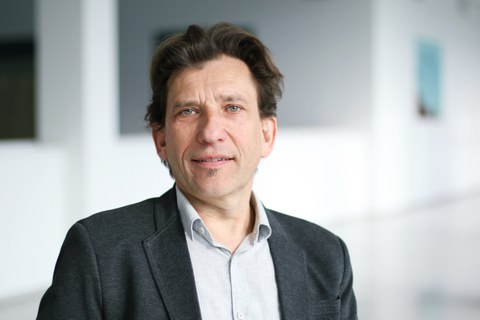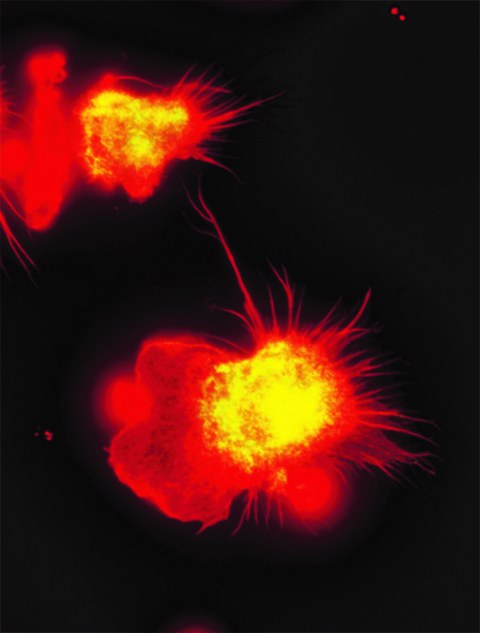May 08, 2018
2018 Humboldt Professorships awarded: Top researcher Prof. Dr. Michael Sieweke joins TU Dresden CRTD as research group leader
The Center for Regenerative Therapies TU Dresden (CRTD) has won Michael Sieweke, an internationally renowned immunologist, for research into new therapeutic approaches in regenerative medicine. After working in the USA and France, Sieweke is now conducting research in Dresden.
Ten Alexander von Humboldt professorships will be awarded on May 8 in Berlin. With five million euros each, this is Germany's highest endowed research prize that brings top international researchers to German universities. With Prof. Michael Sieweke, TU Dresden and CRTD have now successfully achieved this. The awards will be presented at a ceremony by the Federal Minister of Education and Research Anja Karliczek and the President of the Alexander von Humboldt Foundation Hans-Christian Pape. Prof. Dr. Michael Sieweke will receive a Humboldt Professorship, which he hopes to dedicate to research into declining tissue regeneration in old age. His research group at the CRTD focuses on the interface between immunology and stem cell research. The so-called macrophages play an outstanding role here. These are long-lived cells of the immune system that play an important role in tissue renewal. He is investigating how these cells develop, renew themselves and maintain tissue function in various organs. In doing so, he hopes to find out how healthy ageing is possible. Since macrophages occur in every organ of the body, this is of broad importance for many diseases of old age, such as dementia or cardiovascular and lung diseases.
Together with his colleagues, Sieweke discovered how blood stem cells can be stimulated to form new macrophages and related white blood cells. Thereby, a naturally occurring mechanism is used: in case of infections, certain messenger substances are released to which blood stem cells react with increased formation of immune cells to combat pathogens. The therapeutic use of this mechanism could in future help patients to rebuild a functioning immune system much faster in several conditions, such as after a bone marrow transplant.
In addition, he and his team discovered how macrophages can control themselves and divide almost indefinitely in order to renew themselves. Until then it had been assumed that macrophages, like most other body cells, had largely lost their ability to divide. However, his work has now shown that macrophages can activate a network of genes that are also used by embryonic stem cells to multiply indefinitely. It is important that this is controlled and does not lead to an increased risk of cancer. The possibility of producing unlimited amounts of macrophages in culture and modifying them specifically for transplantation opens the door for new therapies. In the future, Sieweke hopes that the understanding and manipulation of macrophages will contribute to counteract the tissue degeneration that occurs with increasing age through the reactivation of young regeneration mechanisms. "I believe that the immune system and especially the macrophages will be a key to understanding regeneration. The CRTD is ideal for exploiting this potential. It brings together people who work on different model systems of regeneration and has a unique proximity to the clinic," says Sieweke.
Quotes
"It is a great honor and a special incentive to have Alexander von Humboldt as patron of the title. He was one of the great researchers who made the importance of science for society accessible to a broad public and someone who, as a citizen of the world and with his French friends, showed us that science lives from international cooperation".
"The immune system is often seen only as a defence mechanism against pathogens. But I think it has an equally important role in tissue renewal that I want to understand and harness."
"I think that the combination of immunology and regenerative biology will be extremely fruitful for both disciplines and that I can use my continuing connection with France in particular to strengthen international cooperation in this field.
General information on the Humboldt-Professorship
https://www.humboldt-professur.de/de/ueber-die-humboldt-professur
Video about the Alexander von Humboldt Professorship of Michael Sieweke
https://www.youtube.com/watch?v=2TmNfA2BHQc
Website of Prof. Dr. Michael Sieweke
http://www.crt-dresden.de/research/research-groups/core-groups/crtd-core-groups/michael-sieweke/
Media inquiries:
Franziska Clauß, M.A.
Press Officer
Tel.: +49 (0) 351 458-82065
Founded in 2006, the DFG Research Center for Regenerative Therapies Dresden (CRTD), Cluster of Excellence at the TU Dresden has passed the second phase of the Excellence Initiative which aims to promote top-level research and improve the quality of German universities and research institutions. The goal of the CRTD is to explore the human body's regenerative potential and to develop completely new, regenerative therapies for hitherto incurable diseases. The key areas of research include haematology and immunology, diabetes, neurodegenerative diseases, and bone regeneration. At present, eight professors and twelve group leaders are working at the CRTD – integrated into an interdisciplinary network of 87 members at seven different institutions within Dresden. In addition, 21 partners from industry are supporting the network. The synergies in the network allow for a fast translation of results from basic research to clinical applications. The CRTD is part of the Center for Molecular and Cellular Bioengineering (CMCB). www.crt-dresden.de / www.tu-dresden.de/cmcb


